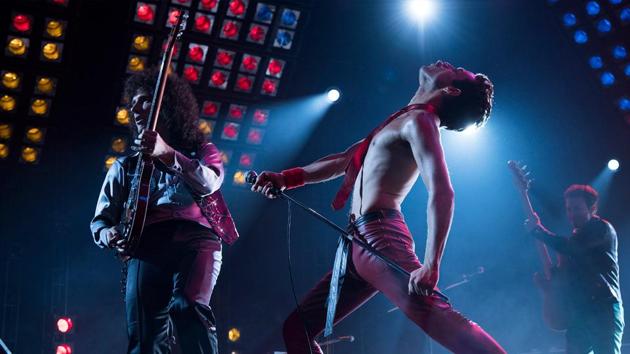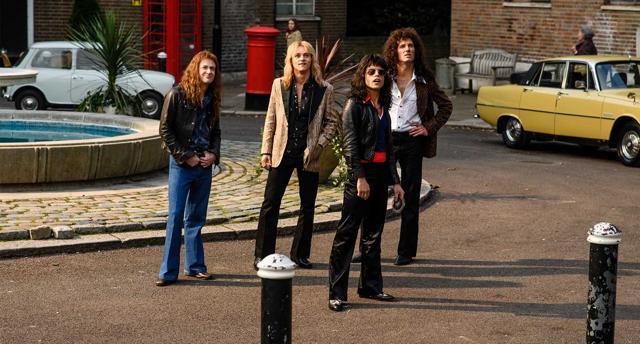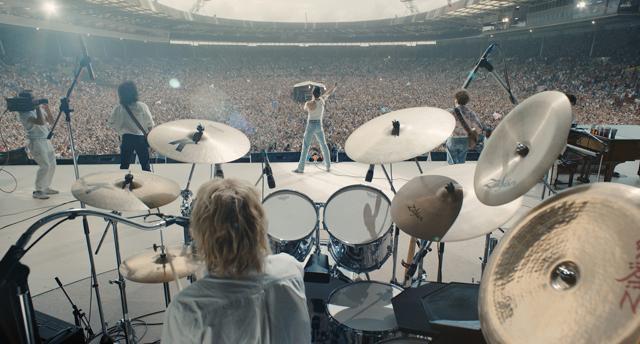The Taste with Vir Sanghvi: Why Bohemian Rhapsody does not tell the truth
The movie never set out to tell the real story of Queen or to deal with the critical issues about Freddie’s evasions so it would be unfair to judge it on that basis. Treat it as a jukebox/karaoke nonsense musical.
Early on in Bohemian Rhapsody, the new movie about the band Queen, Freddie Mercury’s father lectures him. Be true to yourself, he says.

And yet, as we now know, there was no profit in being true to anything. Mercury, a Parsi (real name Bulsara), routinely lied about his origins and went to great lengths to distance himself from his Indian roots, inventing a bogus persona for himself. And Bohemian Rhapsody, the movie itself, is true to very little. The plot twists and bends the truth out of shape only so that it can make for a good story.
Poor old Mr. Bulsara should have known. There is often more profit in being fake than true. Young Freddie (Farrokh) Bulsara went on to become one of the world’s most popular rock stars on the basis of a made-up back story. And despite some truly abusive reviews, the movie Bohemian Rhapsody is on its way to becoming a huge box office hit: grosses of US $ 300 million or more are already in the bag.
Like most Indians of my generation, I have mixed feelings about Freddie Mercury. I became a fan around 1973/4 only on the basis of the music. I heard the early songs on the radio and loved them: The Seven Seas of Rhye, Killer Queen, Now I’m Here, and so many more. I did see Queen once in a while on Top of the Pops, the only pop music show of any consequence in that pre-satellite TV era, but contrary to what people now imagine, it was never Freddie’s androgynous personality that appealed to early fans. In those days, unless you went and saw the band live (which few of us could do; in any case, I was in boarding school at the time), it was the records you judged them by.
The music press, in that era, did not like Queen. It portrayed Freddie as a pretentious tosser and the other three members of the band as bores. (Well yes, they were deeply uncharismatic.) Consequently Queen never quite achieved critical respectability. When questions were asked about the band they rarely focussed on say, Brian May’s guitar solos. Instead critics asked: was Freddie gay? And which part of the world was he from?
To both questions, Queen responded with lies. The band’s name may be Queen, we were told, but they were all straight. In fact, as we now know, Freddie was bisexual from the very beginning and exclusively gay soon after he became a star.

It was the lies about Freddie’s origins that intrigued me. I always thought he looked Parsi but my suspicions were only confirmed when a Rolling Stone article revealed that his name was Bulsara. This did not mean much to the author of the article who bought Freddie’s line that his father was a British civil servant who travelled around the world. This, said Freddie, was why he had been brought up all around the British Empire. I was dubious: there was not much of an Empire left by the late Fifties and the Sixties so how did this make any sense?
Then Freddie proceeded to further embellish the truth. Asked where he was from, he replied “Zanzibar.” This was less a lie than an evasion. His father had taken a job there. But Zanzibar was a place few music journalists had heard of so there were no follow-up questions. At other times he said he was Persian. And then he stopped answering questions about his origins completely.
Asked by a better informed music journo why he never talked about his family or the relatives he had left back in India, Freddie was dismissive. “Oh that’s so boring, darling. Let’s talk about something else?” he said, shortly.
Both sets of lies seemed to me to be unnecessary. I don’t think gay people should be required to answer questions about their sexuality, it is their own business. But equally, it is hard to see what Freddie gained by lying. Teen idols needed to pretend to be straight, but rock stars did not. By the late Seventies, when Queen were big, there were enough openly gay musicians ranging from David Bowie who flaunted his sexuality to Elton John who sold more records than Queen ever did.
As an Indian fan of the band, I was particularly disappointed by Freddie’s repeated attempts to conceal his ethnic origins. It was almost as though he felt that being an Indian was something to be ashamed of. And yet, once again, there was no need to lie. Yes, Seventies Britain was racist but musicians were allowed to be honest about their race and nationality.
Rock, as a genre, had emerged from black roots . And as far back as the late sixties, nobody cared that say, Jimi Hendrix, was black. And even in the stuffy world of classical music, Zubin Mehta, a fellow Parsi, made no attempt to hide his origins, always proclaiming that he was proud of his Indian passport, which he refused to surrender.
In contrast, it was not until Freddie died in 1991 that photos of his sari-clad mother appeared or that we discovered that he had been to school in the Maharashtra hill station of Panchgani and were told that his last rites would “be conducted according to Zoroastrian tradition.” (Well, sort of: he was cremated.)
The film does not make too much of these lies and evasions. But then, its whole plot is largely made-up anyway. No, Freddie did not wander in to meet the band Smile and give an instant audition. (He knew them well, already). No, Queen never broke up only to reconcile at Live Aid. The year before that concert, they had released a studio album. No, Freddie did not say sorry to his band mates and beg to be taken back into Queen just before Live Aid - they were together anyway.
And yes, he spent part of the 1980s in the more outre gay clubs of Germany but he was not diagnosed as HIV positive before Live Aid as the film has it. (Nobody is sure about the exact date of the diagnosis but it was at least two years later.) He was hale and hearty when he performed at that concert (which was a kind of comeback for Queen after dwindling record sales - particularly in America) and one reason why the set was so good was because of Freddie’s high energy levels. (In the film, Freddie is portrayed as being sick and weak before suddenly turning in an energetic, crowd-pleasing performance.)
It is these lies that have so enraged critics all over the world. But one reason why the film has got away with these distortions is because most of the people who have lined up to see it don’t really know the real story. And in many cases they don’t even care.
All they remember is the music.

And how great some of the music was! Contrary to popular belief, it wasn’t all written by Freddie. Radio Gaga was written by Roger Taylor. Another One Bites the Dust was written by John Deacon. We Will Rock You came from Brian May. And so on.
Because Queen had four accomplished songwriters, it kept producing great songs. Freddie’s own greatest achievement was, of course, Bohemian Rhapsody, after which the film is named. It was reported that the other band members did not even sing on the track: it was Freddie’s voice, painstakingly overdubbed in the operatic bits. (Though that is not the way the film— supervised by the surviving band members—has it.)
And Freddie was a consummate performer. In 1977, around four years after I became a dedicated fan, I finally got to see Queen in concert at the Hammersmith Odeon. And though the show had its sillier moments (at one stage, Freddie poured himself a glass of Moet et Chandon on stage and toasted the bemused audience:, “May you all drink champagne!” ) he did rule the stage.
The album Live Killers, despite its studio overdubs, is an accurate and excellent representation of the band at that stage of their career.Those performances are far better than the Live Aid set.
The last time I saw Queen live was in 1987 at Wembley (scene of their Live Aid triumph). I thought the music had begun to get patchier but Freddie was still Freddie, totally in control of the stage. And no, contrary to what the movie suggests, he looked fine in 1987 and delivered a punchy set - though this may have been one of the band’s last shows.
Could it all have been different?
I reckon it could. If Freddie had told the truth about his sexuality, it would have given hope and support to millions of gay kids. If he had not been so ashamed about being Indian, he could have strengthened the fight against racism. (He never agreed to join Rock Against Racism or any of the other organisations that used music to fight racism.)
The movie does not focus unduly on the lies and if you know nothing about the real Queen saga and want a fairy story version of the band’s rise, then I guess it might be fun. It has a simple three act structure. In Act One Freddie becomes a star. In Act Two he turns into an obnoxious jerk. (But the movie suggests that this was only because the poor dear was misled by gay lovers.) In Act Three he repents and begs for forgiveness. The band forgive him and then they all go off and sing songs together.
At the core of the movie is Rami Malek who captures Freddie’s physicality. (Though I would have loved to see Sacha Baron Cohen, the original choice till he dropped out complaining about the rubbish script, play Freddie). And Bohemian Rhapsody is almost worth it for the last 20 minutes or so when it recreates Queen’s Live Aid set.
I guess the movie never set out to tell the real story of Queen or to deal with the critical issues about Freddie’s evasions so it would be unfair to judge it on that basis. Treat it as a jukebox/karaoke nonsense musical.
And you might find you even enjoy it!






